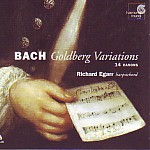Among the selling points Richard Egarr pitches on behalf of his Bach Goldberg Variations recording are the use of a tuning system notated by the composer on The Well-Tempered Clavier Book 1 title page, plus a harpsichord that, according to Egarr’s annotations, is “voiced in a truly correct manner with the correct plucking material.” As if authenticity weren’t enough, Egarr also writes that “to let the music sing and to keep the music from rigidity and haste in any way was helped by the knowledge that I was not straight-jacketed to the 80-minute time restriction of a single CD.” However, what Egarr does not tell you is that there are dozens of harpsichordists who have a steadier sense of rhythm and the virtuosity to play fast tempos when the music calls for it, yet are by no means rigid, hasty, or “non-singing”. These include artists whose overall timings rival or exceed Egarr’s 83 minutes, like Glen Wilson (Teldec), Sergio Vartolo (Tactus), and Igor Kipnis (EMI). So much for the single-CD conspiracy theory.
Furthermore, Egarr is in dire need of the very “straight-jacket” he wishes to avoid–not for restraining purposes, mind you, but rather to align and strengthen the weak and droopy spine that informs much of his playing. Most of the variations for two keyboards are labored, homogenized in articulation (the harpsichord equivalent of Herbert von Karajan’s gooiest legatos), and utterly devoid of lilt or rhythmic impetus. Listen, for example, to Variation 26, where the proud dotted chords sound about as firm and stable as a house of cards in a monsoon, or notice Variation 14’s zigzagging patterns huffing and puffing uphill.
There are exceptions: Variation 16 opens with a brisker, more upbeat characterization of a French Overture than usual, although it doesn’t flow easily into the triple-meter “B” section. And in contrast to the lyrical introspection with which many players shape the minor-key variations, Egarr unexpectedly reveals them in a tougher, more urgent light. We also should credit Egarr for his imaginative ornamentation in the repeats.
The supplementary Goldberg Canons BWV 1087 receive altogether more convincing performances, and you can tell how much Egarr enjoyed overdubbing the parts requiring an extra pair of hands. Still, my reference harpsichord Goldbergs stand. Should Egarr’s songful, intimate Goldbergian aspirations hold appeal, Celine Frisch (Alpha) addresses these qualities with more firmness and finesse.
































